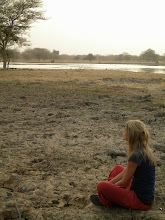Back at Tubaniso, and the 11th marked one month of my Peace Corps training in Mali, and one month until I swear in as an official PCV. I've already become so absorbed in village life here that the outside world is fading away into the ether. There are far less radio waves swimming overhead, telling news of worldly politics, for me to snatch up whenever I like; fewer daily reminders of the constant hum of the rest of the world. It's frustrating to feel the reality of not having access to knowledge in that sense-- to realize that while this is the way I will be living for the next two years, it is a life-long reality for Malians. But I, on the other hand, occasionally am thrust back into the thick of the world, with an email or a news clip or a memory. Coming back into Bamako, then, was a shock for me: hopping into a van full of Tubabs, blasted with air conditioning, switching on the BBC world news with the quick flick of a finger.
One of the things that jolted me out of this state was hearing the news that my friend and former mentor at Aprovecho (the permaculture farm/community I lived at last year), Josh Fattal, was one of the three American travelers who was arrested along the Iraqi-Kurdish-Iranian border and is been detained in Iran. It's all over the news right now, as I imagine a lot of you've heard. One of those things that seems so surreal that you can't really fully connect to it, but that sends your stomach and heart into a swirl of knots. He is a good and vibrant person, one who I learned a lot from and who has a lot to give to the world. I pray that he is released soon.
A lot of things here have been bringing me back to my time at Aprovecho, actually, and I'm realizing that that was some of the best training I could've had for this experience. I wish that I had had the opportunity to take advantage of more of the resources I had at my fingertips then-- especially in relation to Appropriate Technology. It would be invaluable for me to have more formal experience constructing things like solar cookers/dehydrators, improved fuel-efficient mud stoves, rain water catchment systems, etc. Now those resources are a bit harder to get a hold of, since I rarely have internet access.
Nonetheless, my training thus far has been really hands-on and useful-- moreso than for a lot of the other sectors. Right now it is just about getting by day to day, learning and being and taking everything in. Dooni dooni, little by little, as they say. Because of all this, I find it easy to forget why I'm here-- all of the grandeur of ideology and joint anger/hope about the state of the world that pushed me to do this. But I'm realizing that THIS is what truly grassroots, bottom-up development work is about. Starting at the basics. Really learning a place. Experiencing first hand, and slowly, the effects of decades of colonialism, deforestation, climate change, and restrictive regimes/trade policies on everyday people. ASKING what the needs of the community are, and then implementing projects.
I leave tomorrow to FINALLY go visit my site, Pellini! They just announced site locations for everyone a few days ago, so we're all pretty fired up. Yesterday all of our 'homologues' (a.k.a. Malian counterparts from our respective villages) made their way to Bamako for our official introductions and some group training. Pretty intimidating, but rewarding as well. My homologue's name is Kassim Kansayi, and he is a Bambara teacher for secondary school, probably in his late 20s. He speaks enough French to have good conversation, and we get along really well. We went to villages that current PCVs are located and did some community assessment projects in the last couple of days, which was eye-opening. The way that we function/are trained to think and analyze problems in the States is very different from here. Over and over, we are learning that perhaps the greatest way in which we will grow here is in becoming extremely patient.
Tomorrow will open up an entirely new world for me, hopefully one that does not include getting violently ill on the 12 hour bus ride to Dogon country, running over any livestock (although I wouldn't mind hitting a donkey), or getting pickpocketed. All of the people that have been placed in my region are amazing, so I'm feeling really lucky. We have all of the good French speakers as well, since we're going to a place with so many dialects. But then again, some of my best friends here have been placed on the opposite side of the country. C'est la vie.
I won't have internet access for another two weeks (seeing a trend yet?), so until then, drink a nice iced cocktail in my name, while I sip on lukewarm piss-water African beer, thinking of you.
BISOUS!
Subscribe to:
Post Comments (Atom)


well then, kɛnɛya!
ReplyDeleteI'm about 2500 miles north of you (and a little to the east) and its pretty darn hot up here but when I read your posts I can't find anything to complain about! However, I actually sometimes wish there were less radio, tv, cell phone, internet, free newspapers etc. news/rays bombarding your brain constantly with the latest news and commercials, makes everything so hectic..
cheers
remo